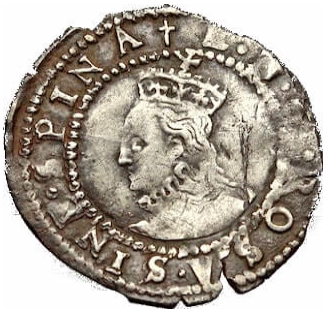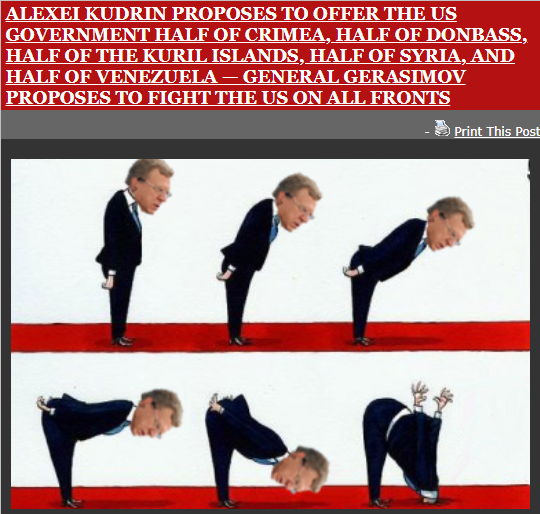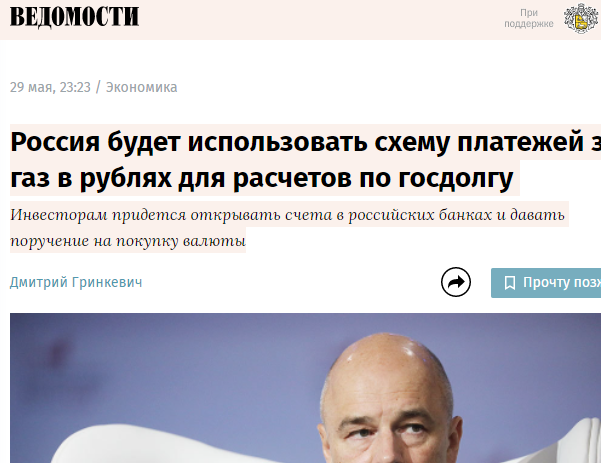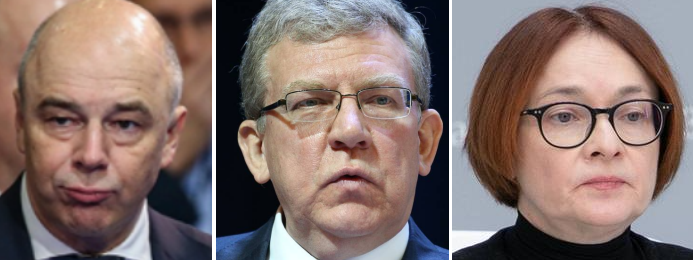Yves here. This post by John Helmer, starting with the scheming financier John Gresham, gives thumbnail sketches of some of the key members of Russia’s economics team. It says a great deal about the modern power hierarchy that the sixth round of EU sanctions targets Patriarch Krill, the head of the Russian Orthodox Church, but leaves the head of the central bank, Elvira Nabiullina, unscathed. It’s also odd to see commentators still convincing themselves that the Russian economy is fragile when it didn’t reel from the roundhouse punch of the Western sanctions.
I’d also like to know why it has taken so long to run Anatoly Chubais out of Russia. He was one of the architects of the 1990s plundering.
By John Helmer who has been the longest continuously serving foreign correspondent in Russia, and the only western journalist to have directed his own bureau independent of single national or commercial ties. Helmer has also been a professor of political science, and advisor to government heads in Greece, the United States, and Asia. Originally published at Dances with Bears

In the history of war-fighting in Europe, what state has waged war when its state treasurer, state banker, and state auditor were opposed to the war; aimed to cut the army off from the money required for troops and weapons; and schemed between themselves to sign terms of capitulation with the state’s enemies?
This question has been answered in a biography of Sir Thomas Gresham, the sixteenth century English monarchs’ banker, foreign exchange manipulator, smuggler, fraudster, land robber, and founder of the London stock exchange and its methods.
The oligarchs of that time were the English Church and the merchants of London. In the employ of King Henry VIII and his successors Edward VI, Mary, and Elizabeth I, the monarchs with Gresham, and their trusted associates confiscated the Church’s land, monasteries, and stocks of precious metals and jewels. When that didn’t produce enough cash, they shaved the coinage, debased the currency, and borrowed abroad. As these methods still fell short of covering their war-fighting budgets, they pirated gold and silver bullion and other treasure cargoes from Spanish ships at sea; started the slave trade in Africa; and imposed a heavy tax on the London merchants which they called a no-interest loan.

Left to right: William Paulet, Marquess of Winchester (1483-1572), Lord High Treasurer; Thomas Gresham (1519-1579), state banker; Walter Mildmay (1523-1589), Chancellor of the Exchequer and state auditor.
Pre-emptive attack and piracy were Queen Elizabeth’s offshore tactics. The weather, spies and bribes also helped win her wars against Spain, France, and the Dutch. The Englishmen who devised these schemes became very rich; they were the oligarchs of the new Elizabethan empire.
John Guy, one of the first English historians to study balance-sheets, wills, and court records with fraud squad methods, has documented how the criminal schemes worked through his life of Gresham. Read it here. Guy makes clear that the “Gresham’s law” commonly attributed to him today – that bad money drives out good – was not only never coined by Gresham; but that Gresham himself – at the direction of Henry VIII – played both sides of the coin, the bad and the good, to cover state money shortfalls and foreign debts, and also to enrich himself. The origin of the law turns out to be in ancient Greece.
 Guy also records how none of these men trusted each other for long; how they spied on and plotted against each other; and how at the slightest suspicion of disloyalty of others, they liquidated them by bankruptcy, banishment, or the royal axeman, convicted by honey traps, faked evidence, and tortured witnesses. Less troublesome and cheaper than all of that, Guy reports the “easy availability of the new wheel-lock pistol (right), one of the landmark technological innovations of the sixteenth century. Uniquely suited to political assassinations, this was a weapon that by the 1560s could be purchased legally almost anywhere in Europe.”
Guy also records how none of these men trusted each other for long; how they spied on and plotted against each other; and how at the slightest suspicion of disloyalty of others, they liquidated them by bankruptcy, banishment, or the royal axeman, convicted by honey traps, faked evidence, and tortured witnesses. Less troublesome and cheaper than all of that, Guy reports the “easy availability of the new wheel-lock pistol (right), one of the landmark technological innovations of the sixteenth century. Uniquely suited to political assassinations, this was a weapon that by the 1560s could be purchased legally almost anywhere in Europe.”
A survey of ancient, medieval and modern historians of Europe has so far failed to produce a single example of a war successfully prosecuted on the battlefield when back at staff headquarters the treasurer, banker and auditor were each and all against the army. By contrast, there are many examples of financiers who have been tolerated for playing both sides in war, and who managed to keep their heads and fortunes, even in revolutionary France, the Napoleonic wars, and Adolf Hitler’s Germany.
It is also obvious that the Wall Street bankers and US Treasury officials who have devised the Russian sanctions schemes since 2014, and especially since February 24, don’t aim to attack the Russian oligarchs, bank robbers and grand larcenists who have turned coat and switched sides against the Kremlin. Starting with Mikhail Khodorkovsky, they comprise a long list — Sergei Pugachev, Andrei Borodin, Boris Mints, the Ananiev brothers, Vadim Belyaev, Vladimir Chernukhin, Leonid Lebedev; the list goes on.
The latest to do a runner, fleeing Moscow for his seaside villa on the Ligurian riviera, in Italy, and then residence and citizenship in Israel, is Anatoly Chubais; he was the state treasurer, banker, and auditor all in one for President Boris Yeltsin. He is reported in the Moscow press to be currently under prosecutors’ investigation of offshore bank accounts with stolen state funds suspected of amounting to billions of dollars. Ahead of Chubais’s departure, Moscow reporters have uncovered details of property title transfers for his $3 million Moscow apartment and his $50 million country estate at Odintsovo, outside the city. These have been papered in the names of nominees associated with a steel and pipemaking oligarch in Chelyabinsk. For more details of how Chubais arranged the acquisition of property through a Swiss company cut-out, which then faced court claims for disputed money from Boris Mints and his family, read this. For Chubais’s financial tie to the pipemakers of the Urals, read this.
Chubais is not sanctioned by the US, nor is his protégé, the former finance minister, opponent of defence spending, US candidate for prime minister, and currently the state auditor, Alexei Kudrin.

Read more: http://johnhelmer.net/
Kudrin’s successor as finance minister, still in the job since 2011, is Anton Siluanov; he is under US sanctions, and so are the heads of the state banks, German Gref of Sberbank, Andrei Kostin of VTB, Andrei Akimov of Gazprombank; and Igor Shuvalov of VEB.
Except for his two years of conscription in the Soviet Army in 1985-87, Siluanov has been a finance ministry official since he graduated from the state finance academy at the age of 22. He worked his way up the ranks under ministers Yegor Gaidar, Boris Fyodorov, Alexander Livshits and Chubais – all advocates of the free market reorganization of the Russian economy and unrestricted capital outflow.
In US bureaucratic terminology, Siluanov is more US Office of Management and Budget than US Treasury. He was deputy head of the budget department of the ministry between 1992 and 1997, when he supervised the dismantling of the Russian social welfare and defence budgets required by the IMF’s borrowing terms; delayed payment of pensions and public sector salaries to paper over the revenue shortfall; and dollarized Russian public finance in place of the ruble. In 1998, when the commercial banks were unable to meet their foreign exchange wagers and the Central Bank declared a default on repayment of ministry bonds to service foreign loans, Siluanov was the ministry’s overseer of banking and macro-economic policy; he reported to Kudrin who was first deputy minister at the time. Their roles in the 1998 default and the simultaneous disappearance of several billion dollars in IMF money, have never been disclosed.
In 2011, when Kudrin was attempting to cut the defence budget and publicly trying to replace then-Prime Minister Dmitry Medvedev, he was dismissed and Siluanov replaced him.
Since the military operation commenced on February 24, Siluanov has made few public statements. In one he corrected his record, as well as Kudrin’s, during the 1998 default crisis, and declared the suspension of his own budget balancing rule. “There are huge funds [in the state budget] for pension provision – 600 billion [rubles] this year, one trillion next year, and the same amounts in the future. Money for the special operation — huge resources are also needed. Citizens also need money to support the economy, the total amount of the so-called budget stimulus that we have launched into the economy is 8 trillion rubles. Huge funds. We need these resources to support the economy, to support our citizens.”
Siluanov has also assured foreign bond holders that Russia will remain a “reliable borrower” and continue servicing its foreign state debt without defaulting. His method, he told the Moscow business newspaper Vedomosti this week, is to bypass the US Treasury’s ban on repayment in either the frozen reserve dollars or in unfrozen reserve funds, by invoking the bond contract provision to allow the Russian treasury to pay in any currency other than the US dollar in the event of “a court decision, an order of a court of any jurisdiction or any other decision”. In order to collect their bond coupon payments, Siluanov said, creditors will be able to do so through opening special state bank accounts in rubles.

The heading in the May 29 report of Siluanov’s interview with Vedomosti reads: “Russia will use the scheme of payments for gas in rubles for settlements on the national debt -- Investors will have to open accounts in Russian banks and give instructions for the purchase of currency” – source: https://www.vedomosti.ru/
The domestic critics of Siluanov fault him for this technical approach in wartime, and for his career commitment to following orders, the domestic and foreign ones. “He’s the purser of the Titanic totting up the crew wage bill as his ship goes down,” comments a politician active in the Donbass. “He has no image of the future, so all he can do is to plan for the past. He cares about the image of Russia the reliable borrower which he’s spent thirty years administering as an apparatchik. He believes this is important in the world, because he has no other vision of the financial world other than the US and IMF-dominated global order.”
“By reliable borrower, Siluanov means not only and not so much the Russian Federation as he means himself. There are a lot of people in Moscow, not only Siluanov, who still can’t realize there is now no old world left. The old ‘rules based order’ is being used to destroy Russia. Siluanov is trying the impossible – to defend with the weapons of the other side. The sorry thing is that Siluanov has no conception of the future. He is waiting for Biden to lose, and for the Republicans to come to power when sanctions will begin to be lifted and everything will be the same again.”
There is no US sanction for Elvira Nabiullina, head of the Central Bank. In April the Canadian government had placed her on their sanction list; the Australian government had done the same a few days earlier. The New York Times then followed with a ringing endorsement of Nabiullina by a string of international banking officials and academics, all of them hostile to Russia and in favour of removing Putin. She was reported by the newspaper to be “an important beacon of stability for Russia’s financial system”, “the very model of a modern central banker”, “never been suspected of any corruption”, “personable, focused, always well-prepared, an advocate of market forces (despite her Soviet-era economics education)”, and finally “she is actually doing something that she didn’t sign up for.”

Left to right: Anton Siluanov, state treasurer; Alexei Kudrin, state auditor; Elvira Nabiullina, state banker.
The Financial Times, which now reports on Russia from Riga, Latvia, has never published an interview with Siluanov, nor a direct comment by him; it hasn’t mentioned Kudrin since 2019. Nabiullina continues to take the newspaper’s direct calls and was last reported in print on April 29.
On April 13, just days after the New York Times promotion, the Wall Street Journalpublished a feature on Nabiullina. “I did reach out for an interview with Nabiullina,” said Alexander Osipovich, a Wall Street Journal reporter in New York who has also published in the Moscow Times. “I was told that her schedule is very busy right now and they did not have time to have me sit down with her. I have spoken to a lot of different economists, people who are both inside Russia and out of it, people who have known Nabiullina over the years, and tried to assemble this portrait of her. Of course, the biggest thing is when you can’t get a direct interview is you don’t really know what people think and what’s driving them. And one of the questions that I have that I tried to address, but I don’t think I could fully address was what does she think about the war? What is her take on the invasion, all these awful things that are happening? Does she see herself as abetting it? Does she see her own role in it? I can ask these questions. I can speculate about it, but I don’t really know.”
“ I do think that a lot of people who are from her, sort of her set, her educated kind of Moscow background, economists, academics, people like that, many of them are horrified by the war and very much against it. Those who have gotten out of Russia are open about this. Those who have stayed in Russia generally have kept quiet about it because if you speak up about it nowadays you’ll get arrested…There were a lot of rumours shortly after the war started that she wanted to leave and had submitted her resignation. We were able to confirm that she had tried to resign, but under not fully clear circumstances it seems to have been denied.”
“Clearly, Putin wants to have her around. He seems to believe that she is an effective crisis fighter. She’s good at keeping down inflation. She is a good manager of the economy. And he wants to have her around for longer. I think that basically if she were to leave and some new unknown person were to come into place, that could be another cause of Russian economic instability, which is probably the last thing that Putin wants right now. [Question: What tools does she have to work with given that this economic crisis is caused by factors related to the war, like sanctions?] Her tools are limited. There are only so many things that the Central Bank can do in a situation like this. Russia is facing very big problems, and it will be beyond her power to fix them. But she is definitely going to be part of the team of people trying to fix them… I think that she has sort of cast her lot with Putin for now. She will be there for the foreseeable future, and she has her work cut out for her because Russia’s facing an economic crisis. She is going to be a big part of the efforts to deal with that, but it’s going to be tough.”
The Moscow Times, a Dutch Foreign Ministry-sponsored publication, has published a sharp attack on Nabiullina for remaining loyal. The writer, Anders Aslund, was a protégé of Chubais and for many years on the payroll of Victor Pinchuk, a Ukrainian oligarch. Aslund is currently living in Washington where he is associated with a foundation financed by the US and UK governments, George Soros, and state sources in Kiev.
According to Aslund, “the high interest rates [Nabiullina] has set have not been responsible for relatively low inflation — the major currency crises played a significant role in that — and the Russian population has suffered from her extreme austerity policies. For some reason Western economists who condemn Germany’s comparatively mild austerity policy praise Russia’s far more severe policy.”
“At Putin’s behest, Nabiullina built up Russia’s international currency reserves to $640 billion, while the Russian people have suffered from her extreme austerity policies. It is clear now that this was not a sensible economic policy but preparation for war.”
“Putin’s war in Ukraine has finally shaved off the halo from Nabiullina. By building up the large currency reserves, she effectively allowed Putin to start the war. She did not understand that the reserves could be frozen by the West, although it had done so to several other countries, such as Iran and Libya. When the Western sanctions hit on Feb. 28, she lost her nerve and doubled the Russian interest rate to 20 percent, aggravating the financial panic. She closed down all financial markets for one month. When they opened partially, they were heavily regulated. She has also ended the convertibility of the ruble.”
“Instead of securing macroeconomic stability, she has participated in Putin’s return of the Russian economy to Soviet times and destroyed the CBR. It is widely rumoured that she wants to resign, but that Putin has not accepted her resignation. It might be better for all if he did.”


The thing I find most striking about this piece is the apparent expectation by westerners of a certain sort that Russians of their kind will exhibit class loyalty.
I’m pretty sure it’s power that will command loyalty. I wonder, how do these westerners perceive themselves?
At the end of this article there is a hit piece mentioned by a guy called Anders Aslund and I am positive that his named has appeared before on NC – and not in a good way. So I did a quick Google search and restricted myself on just what appeared on the first page. So, what do we have in the way of choice quotes?
‘Anders Åslund is a…former Senior Fellow at the Atlantic Council.’
‘Åslund worked with Jeffrey Sachs and David Lipton as a senior advisor to the Russian reform government under President Boris Yeltsin’
‘In 2013, David Frum wrote that “Anders Aslund at the Peterson Institute is one of the world’s leading experts on the collapse of the planned Soviet economy.”’ (yeah, because he helped it to be)
‘The big US political question should be: Why is Trump working for Putin?’ (from his twitter account)
As they say, you are known by who your enemies are and I can see that this is the case here with Elvira Nabiullina.
Thank you, Rev.
Aslund is part of a cohort of continentals and Scandinavians recruited by US think tanks in the past decade, especially as Cameron began to talk up Brexit and John Kerry was appointed Secretary of State, to promote Atlanticist / US interests in Europe. The fear was that the UK was losing interest in the EU, so other vehicles for the advancement of US interests were required.
Aslund is also involved with the campaign for Swedish membership of NATO. Although not named in this recent article, https://newleftreview.org/sidecar/posts/joining-the-west gives a flavour of what and who are behind this long standing campaign. One hopes John A chimes in from Sweden.
The Atlantic Council has recruited the likes of former French diplomat Gerard Araud and academic Benjamin Haddad as attack dogs, especially if / when France suggests anything that may resemble a pan European security architecture that minimises US involvement and leadership and promotes European autonomy.
Aslund and his peer Tim Judah are among a bunch of know nothing guns / whores for hire. One of their party pieces is that the City of London can’t survive without Russian money. We enjoy a good chuckle about that / them at the Watling, which the City ne’er do wells who lurk on this blog will know.
They are well paid, though, and often spotted at university and given US government scholarships.
Thank you for that bit about Tim Judah. I was astonished/appalled at an article he wrote for NYRB soon after the Russian invasion, proclaiming in impassioned tones that “we” must act to preserve freedom in Ukraine. One of his examples was the freedom of his Ukrainian friends to jet off to Barcelona for a weekend.
Thank you.
It has been noticeable in the past month, especially on the BBC, that the war is between Russia and civilisation, no longer Russia and the world. Sometimes, foreign guests refer to the use of troops from east of the Urals and the Caucasus, implying something.
This week, Metro, a London free newspaper, features a gay and non binary couple fighting for Ukraine and, er, civilisation and European values.
Judah is largely employed by US outlets and sometimes by Zionists as per his attacks on Corbyn.
To be fair to Mr. Aslund, he is the kind of know nothing guns/whore for hire, who has the good grace to stay bought.
One might say that to spend so much of ones life studiously knowing nothing, is a remarkable achievement. I’m always amazed by his capacity to utter to most ridiculously banal observations, all of which astonishingly anti-Russian, without any outward sign of embarrassment. Mr. Asland has not changed a jot since his Moscow Times days.
Thank you, Rev.
Further to some of our recent exchanges, the descendants of Paulet (also Powlett) and Mildmay are still around and wealthy and, from time to time, pop up in public life.
The Greshams are extinct, but Thomas Gresham left a fund to the City of London to promote learning. The fund still exists and does a great job. I have attended some of their events, well worth signing up for. My employer, a Dutch bank, is just off Gresham Street in the City.
It says a lot about Russia’s patience that Anders Aslund was not banned to enter Russia at all or thrown into jail after all the pain, death and misery he inflicted on the country.
Anders Aslund is indeed well characterized by RevKev. What is surprising is how good his critique of Russian central bank policy is in the passage that Helmer quotes.
I first met Aslund at a Renaissance Capital dog and pony show pushing stocks in the companies that Russian kleptocrats were grabbing. I’ve met him in Washington and have defended his critics.
But here he is criticizing the IMF and the central bank for putting the exchange rate first — mainly to enable kleptocrats to buy more dollars with their ruble revenue than they otherwise could. what’s going on? :)-
Anne Williamson also documented Aslund’s actions in, “The Rape of Russia.”
https://isteve.blogspot.com/2014/02/the-rape-of-russia-explained-by-anne.html
Chubais, another key looter, has just left Russia and reportedly has millions stashed offshore.
On a related topic, it’s obviously still the case that all parties are avoiding all-out cyber-warfare.
They’re trying to have ‘their‘ war without putting an end to ‘their‘ world.
It’s unanimous, people are expendable, stock exchanges and central banks, out of the question.
Thank you, Bob.
Soon after the invasion, City firms were put on heightened alert. We report to UK regulators monthly.
Thank you for continuing to share Helmer’s work.
Related to Watt4Bob’s comment, “They’re trying to have ‘their‘ war without putting an end to ‘their‘ world.” [italics added]: Every day I wake up (before I put on my makeup) I feel the Great Universal Slot Machine lever pulled into action and wonder, “Maybe today’s the big win, eh? Maybe today I’ll hear the ringing cheer, Jackpot!”
Some while back, lottery games were promoted with the slogan, “You’ve got to be in it to win it”. Too bad there isn’t a way to opt out of this particular one if continued life is a major personal goal.
Tangential thought (say hello to Magpie, everybody) – Were I to post my comment from “Every day” to “personal goal” on Facebook, how many people would be confused, largely around the contextual meaning of “Jackpot”? How far has the Gibson-derived meme diffused into the worlds?
“If the world is ending, run to a bank. It will end there last.” — Karel Capek